|
|
|
Sort Order |
|
|
|
Items / Page
|
|
|
|
|
|
|
| Srl | Item |
| 1 |
ID:
178030
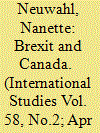

|
|
|
|
|
| Summary/Abstract |
This article investigates how Canada’s trade with the EU-27 and the UK might be affected by Brexit. As the transition period foreseen in the 2019 UK Withdrawal Agreement has ended, the EU and the UK are no longer one customs area. The EU–Canada Comprehensive Economic and Trade Agreement (CETA), like other EU agreements, has ceased to apply to the UK. Henceforth, the policies and legislation of the UK and the EU-27 will invariably diverge. Taking into account both the EU–UK Trade and Cooperation Agreement as well as the Canada UK Trade Continuity Agreement concluded in late-2020, the article shows that the agreements reached, while providing immediate stopgaps for some of the fallout of Brexit, also represent potential for a new departure.
|
|
|
|
|
|
|
|
|
|
|
|
|
|
|
|
| 2 |
ID:
124723
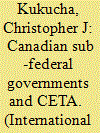

|
|
|
|
|
| Publication |
2013.
|
| Summary/Abstract |
Canadian provinces and territories have gained increasing relevance in matters of international trade over the last several decades. The possibility of a Canada-European Union Comprehensive Economic and Trade Agreement, however, marks the first time that sub-federal governments in Canada have been directly involved in specific areas of negotiations. The significance of this development, examined in this series of policy papers, can be organized under five overarching themes: 1) the negotiation, ratification, and implementation of foreign trade agreements; 2) the need to distinguish between process activity and actual policy outcomes; 3) the ongoing relevance of Canadian federalism; 4) the impact of non-governmental actors, especially civil society; and 5) the differing interpretations of academics, practitioners, business, and societal groups.
|
|
|
|
|
|
|
|
|
|
|
|
|
|
|
|
| 3 |
ID:
128623


|
|
|
|
|
| Publication |
2014.
|
| Summary/Abstract |
Australia is currently negotiating a framework treaty with the European Union (EU) that aims at closer cooperation on a wide range of shared policy goals. The treaty is not expected to include trade-liberalisation commitments. This article queries why this is, given the importance of trade and business relations with the EU for Australia, and the fact that the EU exerts international influence primarily as a trade power, rather than a foreign and security policy power. Since 2006, the EU has also been negotiating 'new-generation' bilateral free trade agreements (FTAs), focusing on tariffs and regulatory non-tariff trade barriers. It has now committed itself to FTA negotiations with many of Australia's trade partners in Asia and the Organisation for Economic Co-operation and Development. An FTA and a complementary framework treaty were concluded with South Korea in 2010, and the EU is currently negotiating a similar package with Canada. As Australia and Canada are comparable trade partners for the EU, the article argues that an FTA on the EU-Canada model could be a more effective avenue for Australia to achieve deeper engagement with the EU.
|
|
|
|
|
|
|
|
|
|
|
|
|
|
|
|
| 4 |
ID:
152500


|
|
|
|
|
| Summary/Abstract |
Trade adjustment assistance (TAA) is government aid to those affected by trade agreements. We review the history of TAA in Canada and ask whether Canada needs to reintroduce it in response to the recent intensification of trade negotiations. In light of the compensation offered by the federal government in connection with the Canada–European Union Comprehensive Economic and Trade Agreement (CETA), we examine how TAA fits in with the evolution of Canadian federalism in the trade policy area. Based in part on interviews with provincial trade negotiators, we conclude, first, that the compensation is an outcome of Canadian federalism. Second, we argue that while there is no reason to reintroduce a federal TAA program for workers, compensation for provinces is necessary to facilitate their cooperation with the implementation of trade treaty provisions. Third, we suggest that a more transparent rationale for such compensation would be superior to the ad hoc compensation observed in CETA.
|
|
|
|
|
|
|
|
|
|
|
|
|
|
|
|
| 5 |
ID:
124725
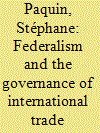

|
|
|
|
|
| Publication |
2013.
|
| Summary/Abstract |
When the European Union (EU) and the Canadian government announced the launching of negotiations to create a "new generation" free trade agreement, the EU insisted that provincial representatives be included on the Canadian negotiating team. The goal of this article is to explain why the provinces have gradually become key, indeed indispensable, actors in international trade negotiations. I examine how international trade negotiations are conducted in Canada, noting the enhanced role for provincial governments, and I focus on a comparison between the Canada-US free trade negotiations and the discussions for a Comprehensive Economic and Trade Agreement (CETA) with Europe.
|
|
|
|
|
|
|
|
|
|
|
|
|
|
|
|
| 6 |
ID:
160901
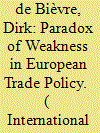

|
|
|
|
|
| Summary/Abstract |
Over the last decade, trade negotiations with Canada and the United States met with considerable resistance from non-governmental organisations (NGO). Moreover, the negotiation mandates given to the European Commission were so broad as to include topics falling under so-called mixed competence of the EU and the member states, necessitating not only ratification by the EU Council of Ministers and the European Parliament, but also member states’ parliaments. At some point, these two factors almost seemed to paralyze the EU as a trade negotiator. In the end, however, the EU concluded an agreement with Canada, renegotiated its agreement with Mexico (while also concluding agreements with Singapore and Japan amongst others), while negotiations with the US were suspended. Three factors can account for this puzzling combination of apparent incapacity and blockage and surprising resilience of EU trade policymaking. First, the NGO contestation campaigns did not muster pan‐European but rather only varying degrees of support. Second, in addition to scrutiny by the European Parliament, consensus decision-making in the Council fosters accommodation of the demands of all member states. This leads to a low degree of negotiating autonomy on the part of the European Commission, yet large bargaining power for the European Union, as long as the other side wants agreement. Finally, a recent ruling by the Court of the EU facilitated the decoupling of agreements on portfolio investment and investment arbitration (one of the most difficult hurdles), from all other matters of trade and regulatory cooperation, making it easier to reach agreement.
|
|
|
|
|
|
|
|
|
|
|
|
|
|
|
|
| 7 |
ID:
159602
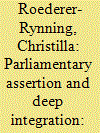

|
|
|
|
|
| Summary/Abstract |
Scholars have long viewed parliamentarians as parochial actors having little interest, or incentive to engage, in international diplomacy. Yet, parliaments have recently taken on a very active role in various international negotiations. This article explores the role of the European Parliament (EP) in the European Union (EU)–Canada Comprehensive Economic and Trade Agreement (CETA) and the EU–United States Transatlantic Trade and Investment Partnership (TTIP) negotiations. Drawing on classic institutionalist insights, it develops the concept of parliamentary assertion and explores its usefulness through a combination of comparative and process-tracing analyses. The conclusions are threefold: (1) the EP has asserted its power in international trade matters beyond the simple power of consent; (2) the EP’s search for legitimacy in the EU polity is driving this phenomenon; and (3) this phenomenon is significant beyond the current CETA and TTIP negotiations.
|
|
|
|
|
|
|
|
|
|
|
|
|
|
|
|
| 8 |
ID:
159599
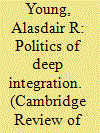

|
|
|
|
|
| Summary/Abstract |
Efforts to pursue ‘deep integration’—agreeing to international rules governing domestic policies to mitigate their adverse trade effects—have been pivotal to the politicization of trade policy. The contributions to this special issue focus on different political dynamics associated with recent high-profile efforts at deep integration. Collectively, they analyse the Transatlantic Trade and Investment Partnership (TTIP), the Comprehensive Economic and Trade Agreement (CETA), the Transpacific Partnership (TPP) and the Japan–European Union Economic Partnership Agreement (JEEPA) negotiations. The special issue, therefore, focuses on extreme examples of deep integration in order to illuminate new political dynamics. This introductory article introduces the concept of ‘deep integration’ and explores how it has been pursued in historical and contemporary trade negotiations. It also relates recent attempts at deep integration to the rise of populist anti-globalization movements. In light of these discussions, this article introduces the contributions to the issue. It concludes by considering whether the politics associated with TTIP and CETA in Europe represent the future of trade policy.
|
|
|
|
|
|
|
|
|
|
|
|
|
|
|
|
| 9 |
ID:
124727


|
|
|
|
|
| Publication |
2013.
|
| Summary/Abstract |
Canada and the European Union (EU) began negotiating a comprehensive economic and trade agreement (CETA) in May 2009. The authors survey both the process and the content of CETA from the perspective of the province of Quebec. For the first time, Canadian provinces and territories have fully participated in international trade negotiations that will impact them directly and engender important economic benefits. CETA will ensure that Canadian provinces and territories obtain real market access for their goods and services to the EU's 500 million consumers. It will encourage and increase foreign investment as well as create further labour mobility between Canada and the EU. Quebec will benefit from a growing and deeper relationship with the EU through trade and cooperation, thereby fostering economic globalization and integration.
|
|
|
|
|
|
|
|
|
|
|
|
|
|
|
|
|
|
|
|
|